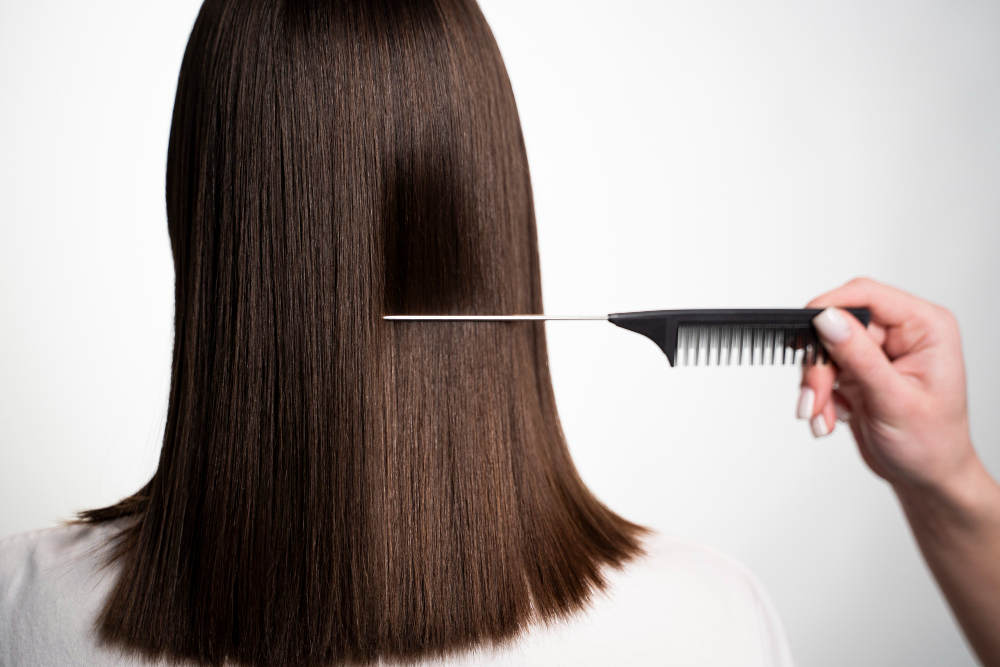
If you’ve ever found yourself gazing enviously at someone’s thick hair, wondering how to transform your own hair to look so shiny, you’re in the right place. In the world of beauty and self-care, luscious and thick hair has always been a coveted attribute. A crucial component of achieving this desirable mane is understanding and enhancing hair density. Our experts will help you understand the intricacies of hair density, uncover the potential causes of low density, and provide actionable tips on how to improve it.
What is Hair Density?
Hair density is more than just the number of strands on your head; it refers to the number of hair follicles per square inch on your scalp. Essentially, it’s a metric that plays a pivotal role in determining the thickness and fullness of your hair. While genetics predominantly dictate hair density, several external factors can influence it as well.
Understanding the Importance of Thick Hair Density
The significance of hair density goes beyond aesthetic preferences. Higher hair density contributes to a fuller and healthier appearance. It serves as an indicator of scalp health and can influence the overall strength and growth of your hair. Understanding the importance of maintaining optimal hair density is the first step toward achieving a vibrant and voluminous mane.
Causes of Low Hair Density

Understanding the potential culprits behind low hair density is crucial for effective intervention.
- Genetics:
Your family history plays a significant role in determining your predisposition to low or high hair density.
- Hormonal Changes:
Periods of hormonal imbalance, such as during pregnancy or menopause, can impact hair density.
- Poor Nutrition:
Inadequate intake of essential nutrients, such as vitamins and minerals, can lead to thinning hair.
- Stress:
Chronic stress can contribute to hair loss and a decrease in overall hair density.
- Environmental Factors:
Exposure to pollutants, UV rays, and harsh weather conditions may compromise hair health.
How to Increase Hair Density?

Now, let’s explore practical ways to boost hair density, addressing both internal and external factors:
1. Balanced Nutrition
Nutrition plays a pivotal role in the health of your hair. A diet rich in essential vitamins, minerals, and proteins ensures that your hair follicles receive the nutrients they need to thrive. Incorporate foods such as leafy greens, lean proteins, nuts, and seeds into your diet. Vitamins like biotin, vitamin E, and omega-3 fatty acids are particularly beneficial for promoting hair growth and strength.
2. Scalp Massage
A soothing scalp massage not only feels relaxing but also promotes increased blood circulation to the hair follicles. Improved blood flow delivers essential nutrients to the scalp, encouraging hair growth and preventing thinning. Book an appointment at Bodycraft Salon for a rejuvenating scalp massage that will leave your lock revitalised.
3. Proper Hair Care
Adopting a proper hair care routine is crucial for maintaining and enhancing hair density. Choose shampoos and conditioners that suit your hair type, and avoid harsh chemicals that can strip your hair of its natural oils. Regular haircut can prevent split ends, ensuring that your hair remains healthy and vibrant. Additionally, be mindful of heat styling tools, as excessive heat can weaken hair strands and contribute to thinning.
4.Growth Factor Concentrate (GFC) Treatment
The GFC treatment involves harnessing growth factors from your blood to effectively address hair loss. Administered through superficial injections directly into the scalp, this safe method not only reduces hair loss but also promotes hair growth, thickens follicles, and increases hair numbers.
View this post on Instagram
5. QR678 Hair Growth Treatment
QR678 treatment offers a non-surgical approach to hair regrowth, effectively reducing hair loss and promoting new hair growth. This growth factor formula is injected into the scalp through mesotherapy, signalling dead hair follicles to regenerate and enter the anagen i.e. the growing phase.
View this post on Instagram
Takeaway
Understanding how to increase hair density requires a multifaceted approach, addressing both internal and external factors. By understanding the importance of hair density, recognising potential causes of low density, and implementing effective strategies, you can embark on a holistic journey towards healthier, fuller locks. Consistency and patience are key in the quest for improved hair density, ensuring that you achieve lasting and satisfying results.
FAQs around Hair Density
1. How can I check my hair density?
Checking your hair density involves a straightforward process. Here’s a simple method to assess it:
- Observation: Section a small area of your scalp and observe the number of hair follicles within that region.
- Professional Consultation: Hair specialists can use tools and techniques to measure hair density accurately.
Remember, if you have concerns about your hair density, consulting with a dermatologist or trichologist is advisable for a precise evaluation.
2. Does shaving my head increase hair density?
Contrary to popular belief, shaving your head does not directly increase hair density. Hair density is genetically predetermined, and shaving your head won’t alter the number of hair follicles. However, shaving can create the illusion of thicker hair because new growth often appears coarse and more noticeable. It’s essential to note that the apparent increase is temporary and doesn’t affect the underlying density.
3. Which oil increases hair density?
Several oils are believed to promote hair health and may indirectly contribute to improved density. Among them, castor oil is often recommended for its potential to nourish the scalp and strengthen hair. The ricinoleic acid in castor oil may stimulate hair follicles, potentially aiding in hair growth. However, individual responses vary, and there’s no one-size-fits-all solution. Experimenting with different oils and observing their impact on your hair can help determine what works best for you.
4. Why is my hair density so low?
Low hair density can result from various factors, including:
- Genetics: Family history plays a crucial role in determining hair density.
- Hormonal Changes: Imbalances during pregnancy, menopause, or other hormonal shifts can impact hair density.
- Poor Nutrition: Inadequate intake of essential nutrients may lead to thinning hair.
- Stress: Chronic stress is a common contributor to hair loss and reduced density.
- Environmental Factors: Exposure to pollutants and harsh weather conditions can compromise overall hair health.
Identifying the specific cause of your low hair density is crucial for developing an effective strategy to address it. Booking an appointment with a healthcare professional or a trichologist can provide insights into your unique situation and guide you toward suitable solutions.